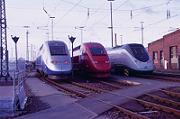Rail platform to address challenges for European rail sector
10/10/2011

VP Kallas is meeting top-level representatives from the European rail and transport sectors during the inaugural meeting of the rail strategy platform. The platform has been set up to give strategic advice to the Vice-President on moving towards a competitive, sustainable and efficient single European rail area.
Vice-President Kallas said: "Rail transport faces many challenges, particularly in view of the ongoing economic crisis. At the same time, the rail sector has an essential role to play in delivering a truly sustainable transport system for Europe capable of absorbing greatly increased traffic flows while delivering climate change emissions reduction targets. We need to fully optimise rail's potential and achieve a high-quality, reliable, safe and dynamic rail sector. I am convinced that the time has come to reflect strategically on the future of rail in Europe in order to ensure a competitive European economy and meet the mobility needs of Europe's citizens and businesses."
The Rail Strategy Platform, made up of 22 high-level personalities from the transport sector invited by Vice-President Kallas, meets for the first time in Brussels on 10 October 2011. The platform represents rail operators, infrastructure managers, trade unions, the rail industry and the ports aviation sector. The platform, chaired by Vice-President Kallas, is expected to meet twice a year to discuss strategic challenges for European rail.
In 2009 the European rail sector generated a turnover of more than €72 billion. Rail carried 405 billion passenger-kilometres (the equivalent of 405 million passengers each travelling 100 km) and transported 362 billion tonne-kilometres of freight. The sector directly employs 790,000 people and European manufacturers are world leaders in rail technology.
European rail policy has promoted the development of effective rail infrastructure, laid the foundations for an open rail market and worked to remove technical and administrative obstacles. Rail is an environmentally minded transport mode which can contribute to establishing new forms of mobility that are energy-efficient and limit the risk of aggravating pollution, congestion and climate change. The Europe 2020 strategy and the 2011 White Paper on transport adopted by the Commission seek to build on what has already been achieved by setting an ambitious vision for rail as an attractive, sustainable and open market that rapidly responds to the demands of businesses and citizens.


